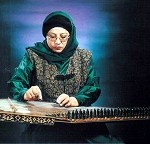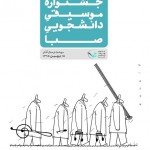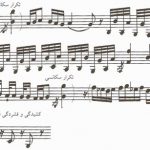A Night in a Persian Garden is the name of a Nocturne composed by the Persian (Iranian) contemporary composer Behzad Ranjbaran. This Nocturne, published recently by the Theodore Presser Company in the US, was performed for the first time in 2002 in New York City by the young Persian pianist Soheil Nasseri and has enjoyed many performances by other pianists.
Tag Archives: Behzad Ranjbaran
Latest posts
- Transition to Enlightenment: Six Lectures on Mozart’s String Quartets (5)
- Nasser Masoudi: The Voice of Gilan and a Legacy of Iranian Music
- Farhad Poupel: The Voice of the Shahnameh in the Orchestras Around the World
- Five Major Myths About Mozart’s Life
- Bahma Rajabi Passed Away!
- Reza Vohdani; Unveiling unpublished works, preservation of Iranian classical music
- Ahmad Pejman Passed Away!
- Timeless or Timely: The Role of Historical Context in Defining Artistic Value
- Leading the Charge in Censorship
- The Legacy of Khosrow Jafarzadeh
- Transition to Enlightenment: Six Lectures on Mozart’s String Quartets (4)
- Fereydoun Shahbazian, An Iranian Musical Icon Passed Away
From Past Days…

Qanun, a feminized instrument?
In the world music culture, there are instruments which were traditionally associated with a certain gender. It remains disputable to what extent these gender-based perceptions have been logical and scientific. For example, as playing wind instruments need more breath strength and the public opinion believe that men have stronger breath compared to women, these instruments are predominantly a male domain. Harp is also considered a female instrument as the public opinion believe that women have finer fingers and can therefore better perform nuances and delicate techniques on the instrument.

The First Saba Student Music Festival Concluded in Tehran
Preparations for Saba Student Music Festival started in the summer of 2016; the Student Music Festival will be held annually by the students of music at Arts University. The first part of the closing ceremony of the Festival was dedicated to the celebration of the life, work and strives by Maestro Hossein Dehlavi to upgrade the level of music as an academic discipline. The name of the award-winning students and ensembles were announced at the second part of the ceremony.

Iannis Xenakis’ Persephassa
Shiraz Arts Festival which was held in Shiraz from 1967 to 1977 featured many contemporary renowned artists who were commissioned by the Iranian royalty to compose or create works of art for performance in the arts festival. Iannis Xenakis (1922-2001) participated in Shiraz Arts Festival three times in 1968, 1969 and 1971. The Greek-French composer,…
Read More

Parviz Meshkatian’s Heart Beat for People (II)
As such, the young Meshkatian reached the position of a great maestro in the Iranian music. Up until 1997, Meshkatian remained prolific and composed many pieces which were characterized by progressiveness while drawing on the music of the past Iranian musicians. In some of Meshkatian’s works, one can trace the influence of maestros such as Faramarz Payvar; however, this influence is so balanced that one can neither say that Meshkatian is a progressive and deconstructionist composer nor does he use cliché forms in his compositions.

Loss of Development in Iranian Music
The mention by music instructors, academicians, students, and music enthusiasts about the lack of development in Iranian music is a topic that has been repeatedly heard, resulting in a superficial understanding and misinterpretation of Iranian music, which has been conveyed to students of the arts. This short essay aims to critique and examine this claim.

Iranian Fallacies – Global Performance
One of the most important criteria for measuring the quality of a piece of classical music is number of times the piece has been performance by different ensembles and orchestras in different eras. This belief has become so pervasive in some societies, such as Iranian society, that it is considered the only criterion for measuring the quality of a piece of classical music.

Call for papers SIMF 1396
The Association of Iranian Contemporary Music Composers (ACIMC) and SHAHREAFTAB Art & Cultural Association are pleased to announce a call for papers for SIMF 1396.

Lilly Afshar, Iranian Guitar Legend, passed away
The text you are reading is about Hamed Fathi, a guitarist and one of Lilly Afshar’s students, which was previously published on the Persian website HarmonyTalk.com:

Mohammad Esmaili passes away
Master Mohammad Ismaili, a prominent musician and renowned tombak player, passed away on August 13, 2023, after battling an illness in the ICU of Rasoul Akram Hospital. His funeral will take place on Thursday, August 17, at 10 am in front of Vahdat Hall, and he will be laid to rest in the Artists’ Section of Behesht Zahra Cemetery.

A brief examination of Ardavan Kamkar’s Santour playing style
I still think of those fish in a crystal bowl for the Haft sin table and those disappointed old men who went out to sell blackfish.